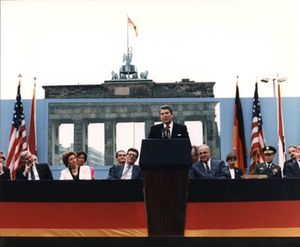The Case for Poland
“Stover, are you sure you know what you’re doing? You mean to tell me that my grandkids are going to be ‘Pollocks’?”
That was my father-in-law’s response (himself a missionary in Thailand for more than thirty years) to the news that my family and I were leaving our ministry in Chicago to join a church planting team in Poland. He was joking, of course, but the reaction was a common one as we prepared to head to the field.
reaction was a common one as we prepared to head to the field.
On June 12, 1987, Ronald Reagan uttered the famous words, “Mr. Gorbachev, tear down this wall.” That speech in West Berlin would drastically change the landscape of Europe forever. Following the loosening of the Soviet grip on Eastern Europe, missionaries began to pour into the former Soviet states. Initially, interest in Poland was strong, but after little results and fierce Catholic resistance, attention turned to neighboring countries.
Why was it such a rough go in Poland? Why were places like Romania and Ukraine so much more open to the gospel? I posed that question to a national pastor here in Poland, and he responded by saying that, unlike some of the other former Soviet states, the underground church was almost nonexistent in Poland during communism. The Polish people’s loyalty was to the Roman Catholic Church (RCC); in fact, many saw Pope John Paul II (himself Polish) as an important catalyst to the ending of communism in Poland. For so many reasons, to be Polish is to be Catholic, but one must visit the country for himself to understand the grip Roman Catholicism has on the Polish people. Only then can one realize the vindictive, controlling, and vengeful character of the RCC and its grip on the people. Of course, when we take a moment to think about it, we understand the amount of power a priest can wield since he has heard the confessions of local leaders from the time of their childhood to the present. True, we are not talking about physical persecution, but we are talking about stifling peer pressure from friends and family toward all who would dare leave the church.
Twenty years later so much has changed. In fact, I would argue that there has never been a greater need for missionaries in Poland. The Polish people have never been more ready to hear the gospel than they are now. What are the reasons for this change? 1.) Capitalism is taking hold, and with that is the realization that education will bring advancement. The twenty- and thirty-somethings are well educated and have learned to ask questions. Those of you who have come out of the RCC know that the church doesn’t react too kindly to questions. People are looking for answers; perhaps the gospel might very well have the answers they need (read a touch of sarcasm). 2.) A sex-abuse scandal among the priests that is equal or greater than what occurred in the United States a few years back has led many once-staunch followers to question the integrity of the RCC. 3.) For many Poles, Pope John Paul II was the only pope they had ever known; they worshiped him like a deity. Witnessing firsthand the political “good ol’ boy” process of electing a new pope disenfranchised many of the younger generation. 4.) Recent inquests have revealed that many priests were informants for the KGB under communism, thus revealing that the RCC was more interested in money and preservation than in ministering to its “faithful constituents.”
China and the rest of the 10/40 window currently occupy most of the missions focus in the United States—and rightfully so. An area containing two-thirds of the world’s population should be of utmost importance. However, in carrying out the Great Commission, let us not forget about the nearly 40 million people living in what I like to call “The Below Forty Window.” Unlike most of Europe, Poland is very pro United States. According to the book A Question of Honor, they have been our allies in every major war since the Revolutionary War. It is a country that has survived the atrocities of Hitler and the weight of the Iron Curtain only to be damned by RCC dogma.
Our response to this people group has been meager at best; a handful of missionaries has come in the twenty years the field has been open, resulting in a .03 percent Protestant population (according to the CIA World Factbook). Christ’s words in John 4 ring true of Poland: “The harvest truly is plenteous, but the labourers are few” (Matt. 9:37). Join me in praying that the “Lord of the harvest” (v. 38) would send more laborers.
 Jason Stover and his family are part of a church planting team in Siedlce, Poland. He graduated from Northland Baptist Bible College (Dunbar, WI) with a bachelor’s degree and is pursuing a master’s degree from Faith Baptist Theological Seminary (Ankeny, IA). His sending church is Bible Baptist Church in Romeoville, Illinois, where he served as both youth pastor and senior pastor. God has blessed him and his wife with three children. Check out his family blog. Jason Stover and his family are part of a church planting team in Siedlce, Poland. He graduated from Northland Baptist Bible College (Dunbar, WI) with a bachelor’s degree and is pursuing a master’s degree from Faith Baptist Theological Seminary (Ankeny, IA). His sending church is Bible Baptist Church in Romeoville, Illinois, where he served as both youth pastor and senior pastor. God has blessed him and his wife with three children. Check out his family blog. |
- 1 view


Discussion